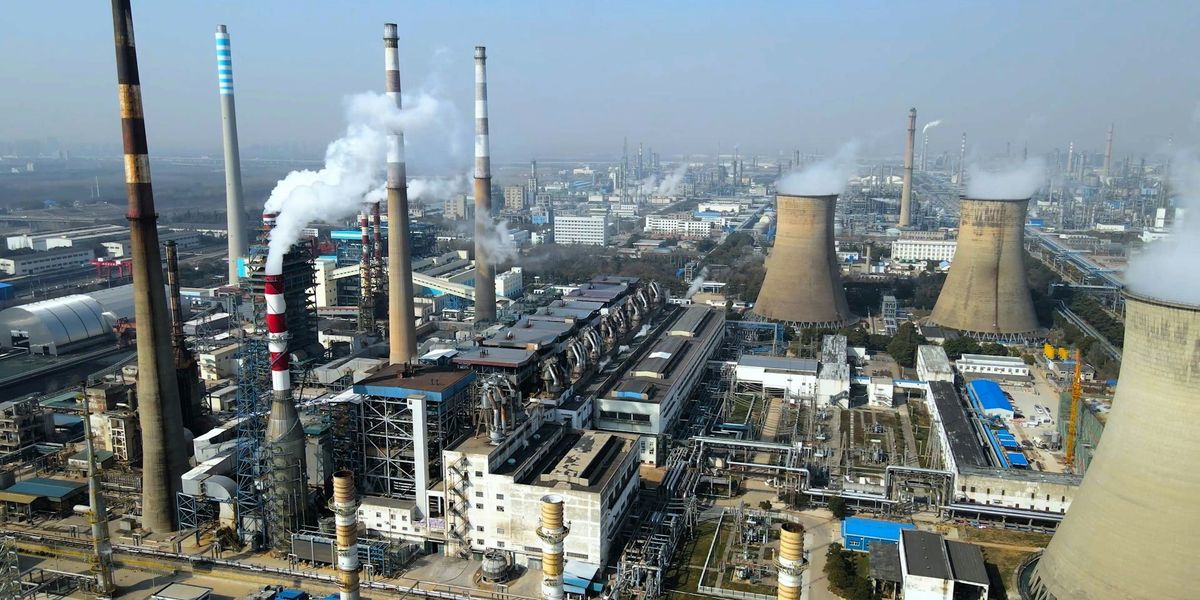plastic treaty
Tensions rise as US stance on plastic treaty draws criticism
Recent U.N. talks in Ottawa reveal significant resistance by major oil producers, including the U.S., to stringent global plastic production caps.
In short:
- The U.N. negotiations aim to finalize a global treaty to end plastic pollution by year-end, but disagreements persist.
- Environmental groups criticize the U.S. for insufficiently addressing plastic production, rather than just consumption.
- U.N. officials express optimism, highlighting progress on treaty drafts and upcoming intersessional work before the next meeting.
Key quote:
"We leave Ottawa having achieved both goals and a clear path to landing an ambitious deal in Busan ahead of us. The work, however, is far from over."
— Inger Andersen, executive director of the U.N. Environment Program
Why this matters:
Plastic has become a symbol of environmental crises. It is estimated that millions of tons of plastic waste end up in the oceans annually, harming marine life and entering the human food chain through seafood consumption. The health implications are increasingly concerning, as studies suggest that microplastics might impact human health through unknown pathways.
Groups push Biden administration to take leadership role at upcoming plastic treaty talks
The US has taken a “middle of the road position” so far, environmental groups say.
In anticipation of the next round of global plastic treaty talks, experts are calling on the U.S. to take a leadership role in pushing for an ambitious treaty.
In a letter sent today, environmental groups ask the administration to support a version of the treaty that includes reductions in plastic production, which has been a contentious issue thus far. In addition,they’re calling on the Biden administration to bolster domestic plastic pollution efforts and be a model for other countries.
“The U.S. is the number one generator of plastic waste in the world — both per capita and total. [It’s] also a leading producer of virgin plastic,” Anja Brandon, the associate director of U.S. Plastics Policy at the Ocean Conservancy, told reporters at a virtual media briefing. “If we want to solve this problem, we need to start at home.”
The Ocean Conservancy, along with 28 other environmental organizations, sent the letter to the Biden administration today calling for a more ambitious approach at the treaty, outlining an eight-point plan to tackle plastic, including establishing a national reduction target that would end new plastic pollution by 2040, supporting policies to end single-use plastics and regulating microplastics.
“Your Administration is in a prime position to tackle the plastic pollution crisis through comprehensive action,” states the letter.
The push comes just weeks before the fourth session of the Intergovernmental Negotiating Committee to develop an international, legally binding plastic pollution treaty, which will take place from April 23 to April 29 in Ottawa, Canada. In the first three sessions of treaty talks, negotiators from about 175 countries — along with industry representatives, environmentalists and others — met to advance a treaty to address global plastic pollution. However, disagreements remain, including over regulating the chemicals in plastic production, plastic production caps, as well as the role of chemical recycling and bioplastics.
“If we want to solve this problem, we need to start at home.” - Anja Brandon, Ocean Conservancy
Many countries have aligned on two separate coalitions. One’s a High Ambition Coalition that wants an end to plastic pollution by 2040, and another one, dubbed the Global Coalition for Plastics Sustainability — largely nations economically reliant on fossil fuels such as Saudi Arabia, Russia, Iran, Cuba, China and Bahrain — is pushing for a larger focus on addressing plastic waste (via chemical and mechanical recycling and other means) rather than plastic bans or limits. The U.S. is not part of either.
It’s been a “middle-of-the-road position so far for the U.S.,” Brandon said. She credited the U.S. delegation for helping the treaty process overcome procedural issues, and is encouraged that they’re still talking about reductions, but said environmental groups remain underwhelmed.
“Is the ambition where we want it to be? Absolutely not. We need to meet this crisis with the urgency it demands,” she said. “We can’t recycle and cleanup our way out of the problem.”
Brandon also made it clear as to what she sees preventing a more ambitious treaty so far: the fossil fuel industry.“[Plastics] are being used as fossil fuels’ plan B” as we move away from fossil fuels as energy, she said.
Felipe Victoria, senior manager for multilateral affairs at the Ocean Conservancy, told reporters that at the Ottawa meeting this month leaders will decide which options for tackling plastic will be chosen in the final agreement. There are two planned treaty meetings after Ottawa.
“A lot of progress needs to be made in this session,” he said.
Existing plastic legislation as a model
Alexis Jackson, associate director of The Nature Conservancy’s California Oceans Program, told reporters the Biden administration and other countries should look to existing plastic legislation in steering national and international plastic pollution efforts.
She pointed to California’s landmark SB-54 law, which mandates that all single-use packaging and plastic food service ware in California be recyclable or compostable by 2032, with a 25% reduction in single-use plastic packaging and food service ware and a 65% recycling rate for these materials.
A couple main points of SB-54 should be included in the treaty, she said, including reductions in how much plastic is made and a “polluter-pays” model where plastic producers are financially and physically responsible for the material’s end-of-life management.
Brandon said though they haven’t seen a “huge shift in priorities,” consistent pressure from environmental groups and the public could steer the U.S. into a more progressive approach.
And, she added, even once the treaty is established, the work has just begun.
“Getting to a treaty is getting to the 50-yard line. It’s what you do after.”
Check out our primer on the treaty talks.Everything you need to know for the fourth round of global plastic pollution treaty talks
Countries will meet this month in Ottawa to move forward on the historic treaty — but obstacles remain.
In the first three sessions of treaty talks, negotiators from about 175 countries — along with industry representatives, environmentalists and others — met to advance a treaty to address global plastic pollution.
What’s at stake in the plastic treaty talks?
The plastic crisis is threatening both the planet and human and wildlife health.
- Global plastic waste is set to almost triple by 2060.
- The world generates roughly 400 million tons of plastic waste each year.
- Less than 10% of plastic ever made has been recycled.
The treaty is the first international attempt to address this.
What’s the state of the plastic treaty?
Consensus was elusive at the last round of talks in Kenya.
There is a High Ambition Coalition of countries that wants an end to plastic pollution by 2040. There is also a Global Coalition for Plastics Sustainability — largely nations economically reliant on fossil fuels such as Saudi Arabia, Russia, Iran, Cuba, China and Bahrain — that has positioned itself as the counterbalance to the High Ambition Coalition and is pushing for a larger focus on addressing plastic waste (via chemical and mechanical recycling and other means) rather than plastic bans or production limits. The U.S. is not part of either.
Some sticking points include:
- Regulating the chemicals in plastic production
- Plastic production caps
- The role of chemical recycling and bioplastics
Where can I learn more about the plastic treaty?
You can see all of the details of the upcoming treaty meeting at the UN Environment Programme website.
Want to learn more broadly about the treaty and how plastic pollution impacts our health? Our newsroom has been hard at work on exploring these issues. Below we have articles to help you understand the treaty process and progress, plastic impacts to our health and chemical recycling and bioplastics.
And follow our newsroom on X, Instagram or Facebook to stay up-to-date on this historic treaty.Plastic treaty coverage
“Plastic will overwhelm us:” Scientists say health should be the core of global plastic treaty
Opinion: Pete Myers discusses the "Health Scientists' Global Plastic Treaty"
Plastics treaty draft underway, but will the most impacted countries be included?
Opinion: UN plastics treaty should prioritize health and climate change
Op-Ed: How the United Nations could avoid silencing voices during Plastic Treaty negotiations
Scientists: US needs to support a strong global agreement to curb plastic pollution
Plastic and our health
Plastic chemicals are more numerable and less regulated than previously thought
Recycling plastics “extremely problematic” due to toxic chemical additives
Every stage of plastic production and use is harming human health
Massive new database on how plastic chemicals harm our health
Chemical recycling and bioplastics
Bioplastics: sustainable solution or distraction from the plastic waste crisis?
Chemical recycling grows — along with concerns about its environmental impacts
This will be a big year in shaping the future of chemical recycling
Chemical recycling “a dangerous deception” for solving plastic pollution: Report
Q&A: Director of sustainability at Eastman Chemical Company talks chemical recycling
Latest chemical recycling plant closing spurs concern over the industry’s viability
Talks on a landmark treaty to end global plastic pollution are advancing in Kenya's capital
First ‘plastic rain' weather forecast predicts 50 kg of microplastics
The French capital will experience billions of microplastic rain during the five-day plastic treaty international discussion on Monday, their first-ever plastic pollution weather forecast predicts.
The world’s nations agree to fix the plastic waste crisis
A plastic pollution treaty, called Paris Plus, would come with a mandate—and more muscle than the climate accord.
Global treaty to regulate plastic pollution gains momentum
Even producers have an interest in global rules on plastic waste that would resolve the inconsistencies among countries.



















